#(the RU is for RUssia)
Text
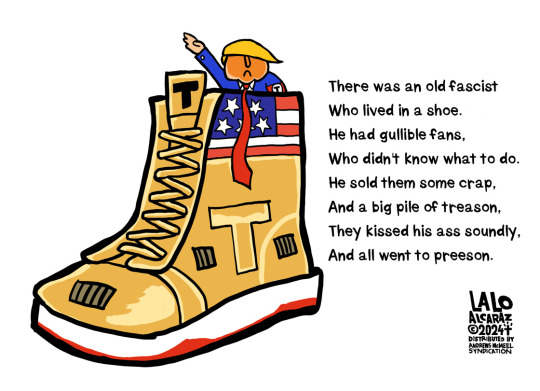

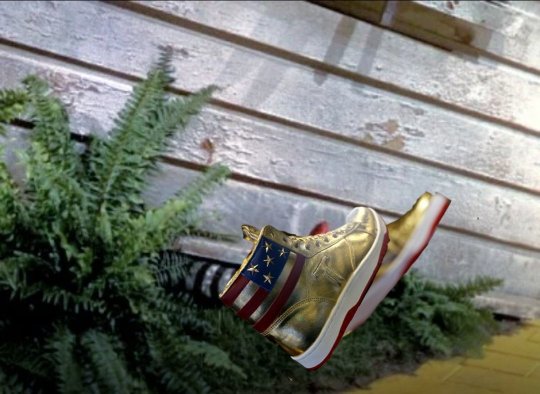
#editorial cartoons#lalo alcaraz#nick anderson#gold sneakers#tRUmp#(the RU stands for RUssia)#political cartoon
156 notes
·
View notes
Text
I'm seriously going mental over this Rus' and Russia distinction. The precise reason Peter the Great changed the name from Moscovy to the Russian Empire was to establish a direct connection to the rich history of Kyivan Rus' and assert the claim as the sole true descendant of the Rurik dynasty. His thought process went like this: to build a formidable empire, a strong historical foundation is needed. Moscow's ties to the Mongols were not as significant as the history of the Kyivan state, which prior to the Mongol invasion of 1240 was one of the most advanced in Europe and had numerous representatives in various ruling dynasties. Credit must be given; he succeeded in doing so. Even centuries later, I find myself reading, listening, and observing his actions in effect as Russians and Europeans, blindly following the centuries long lies, erase my country's and my people's history.
#Kyivan Rus is a medieval state that put a start two three states of Ukraine Belarus and Russia#three of them after the desintegration of it had a completely different development#but to put an equal sign between russia and rus is to reveal yourself as an incompetent moron#sorry not sorry#and as once was said Ukraine unlike other states don’t have to look for and unceremoniously steal the proof of its history#we just have to look at the stones our cities stand on#history#ukraine#Kyivan Rus
226 notes
·
View notes
Text
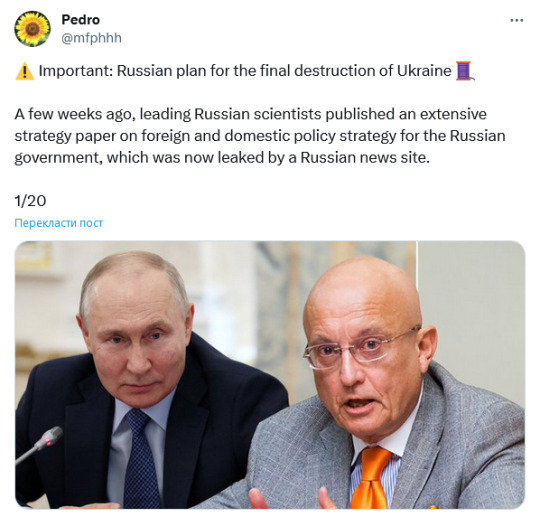
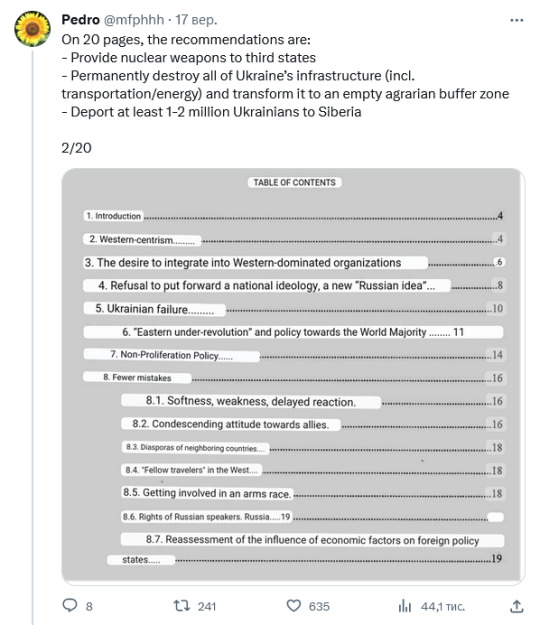
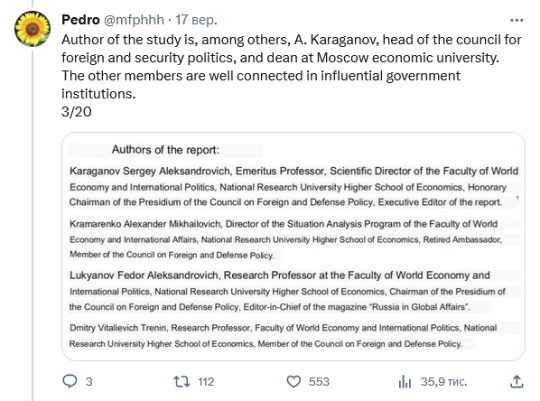


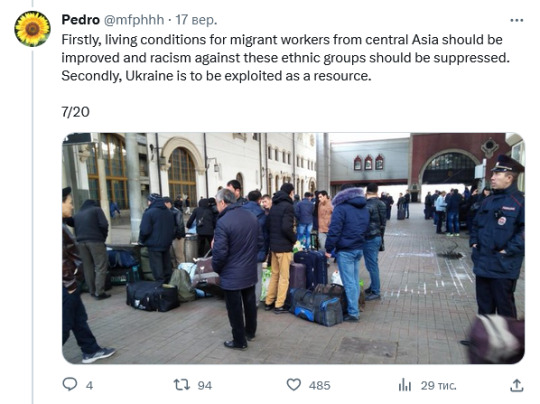

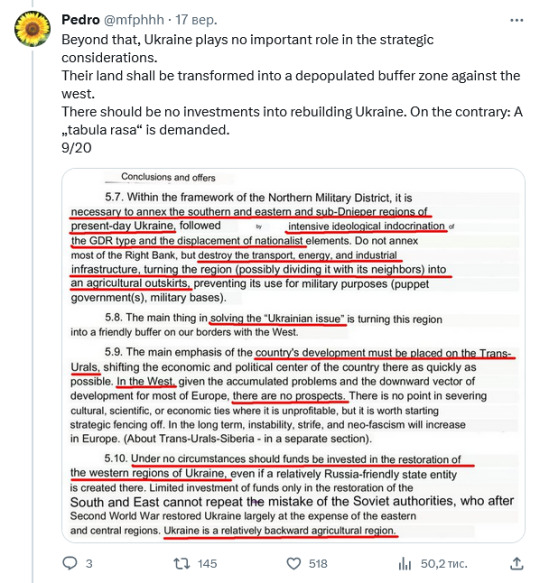


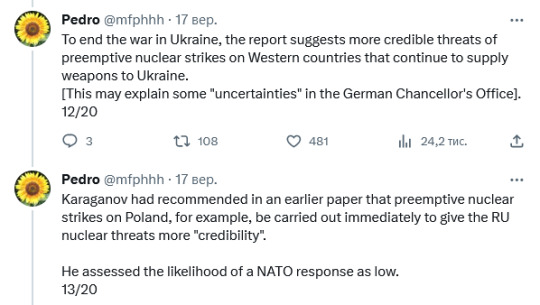


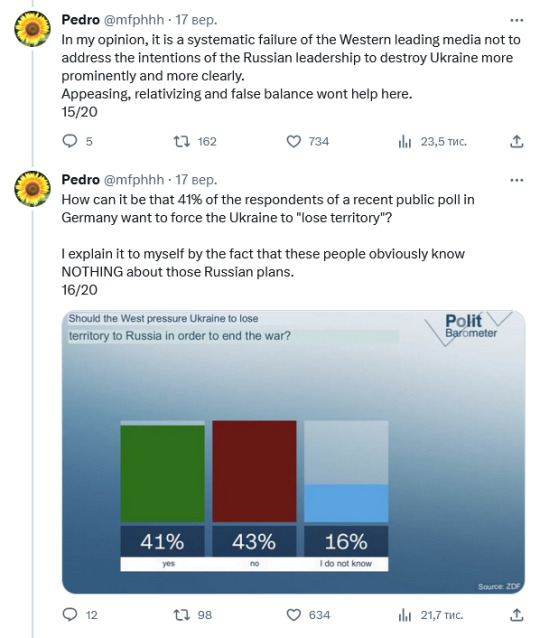

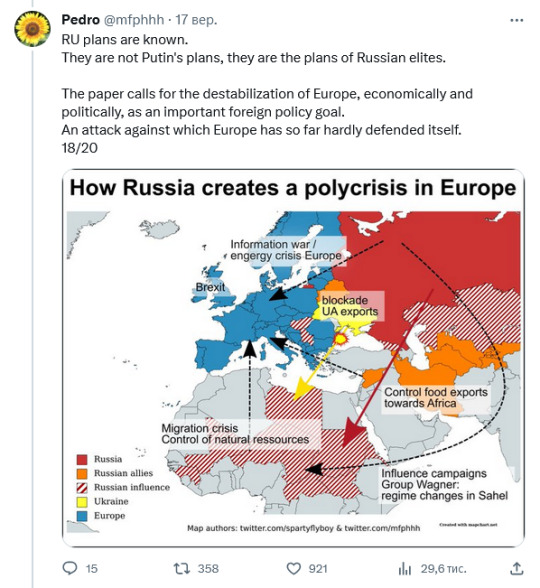


#ukraine#russia#war in ukraine#russian invasion of ukraine#russo ukrainian war#politics#russian invasion in ukraine#again? again#if you wonder the lead ru analysts are criticising putin for being too soft#ригати хочеться від цього тексту
274 notes
·
View notes
Text
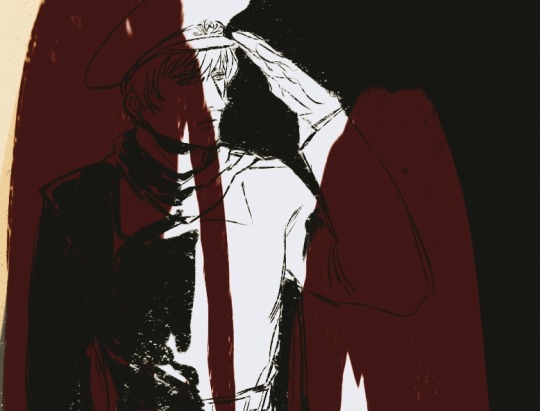
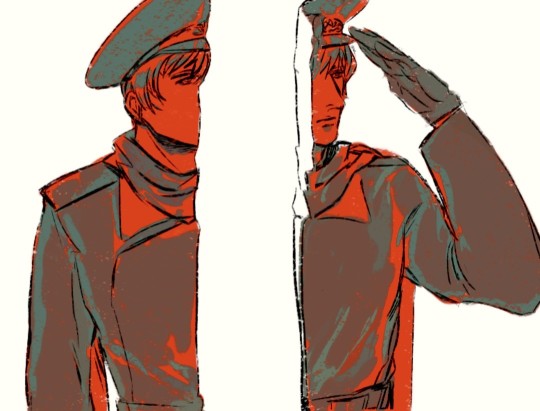
And over time, we have learned from the past
That no man's fit to rule the world alone
A man will die, but not his ideas
Happy nation
Living in a happy nation
109 notes
·
View notes
Text

#nancy drew#nancy drew games#nancy drew russia#clue crew#treasure in the royal tower#alexei markovic ru
51 notes
·
View notes
Text
Putin told his version of the history of the GDL and said that Zelensky's father fought against fascism, although he was born after the war
In an interview with American journalist Tucker Carlson, russian president Vladimir Putin said that he considers the Grand Duchy of Lithuania to be a russian state, as "russians made up a significant part of this state." According to him, after the unification of the Grand Duchy and the Kingdom of Poland, the Poles began to annex the lands of modern Ukraine.
.
Laughing my ass off. Grand Duchy of Lithuania consisted mostly of Lithuanians. Lithuanians back then were: Lietuviai, Lićviny, Samogitians, and Ruthenians (people of Kyivan Rus'). Well, and a bit of Tatars. Lietuviai are modern Lithuanians, Lićviny are modern Belaruthians, Ruthenians (rusy) are modern Ukrainians. And Ruthenians made about 1/3 of GDL, not "most of them". There were no russians in Grand Duchy of Lithuania because russians were called muscovites back then, who eventually occupied Belaruthian Smalensk. Vytautas tried to make a friend out of moscow Duchy, but since russia has always been sick in the head, he didn't succeed, sadly.
And GDL wasn't also called "Lithuanian-russian". It was called "Lithuanian-Ruthenian-Samogitian" because Ukrainians are pretty independent.
59 notes
·
View notes
Text
Bros, the ideas that circulate in canon and fanon around eastslavic siblings really seem strange to me.
It is strange to expect a japanese man to be well versed in the intricacies of eastern european history of the early and high Middle Ages, but to expect this from an english-speaking fandom (mostly northamerican, let's face it) is also, it seems to me, pointless.
Let me explain. "Kievan Rus" is an artificial construct adopted from russian imperial/soviet historians. Moreover, it’s not just a matter of the name, as, you know, the late Rhomean Republic is called the “Byzantine Empire”, it’s just that there was LITERALLY no such state as “Kievan Rus”. In the space approximately from the Baltic and White to the Black Seas, there were numerous proto-urban and urban settlements of slavic, finno-ugric and baltic (as well as other) tribes, which entered into alliances with each other, sometimes quite strong, but still remained isolated. Of course, it would be disingenuous to say that since the beginning of time the urban educated population did not develop some kind of common identity… for some time.
But if we talk about actually existing cultural regions, determined by geography and economics, then, in fact, it is worth highlighting Northern (Novgorod) Rus' and Southern (Kievan Rus' itself), in a very simplified scheme. One of them was tied to the countries around the Baltic Sea, like the scandinavians, the baltic tribes and northgerman cities, as well as the slavs of modern East Germany. The other constantly encountered nomads, “Byzantine Empire" and, to a lesser extent, the western and southern Slavs (and magyars!). They were never able to truly become a unified state.
Of course, this is a simplification, because in addition to the Rurikids in the North, who subjugated the South and over time moved there (while the south over time began to separate itself, in particular, into the Novgorod Republic), there was a separate center in Polotsk and some others, but it approximately reflects the essence and, if I were asked about personifications, then I would make two separate MAIN personifications for Rus', Novgorod in the North (male) and Kiev in the South (female), which would be the parents of the future Ukraine, Russia and Belarus.
But if you asked me in even more detail, then Belarus should stand a little aside. You know, in fact, historically it is more archaic and “stagnant” than Ukraine in the south and Russia in the northeast. Did you know that lithuanians called belarusians an ethnonym derived from the name goths lol? Plus, genetically and partly culturally, belarusians, like some poles, are closer to the baltic peoples, and not to the rest of the slavs. Taking into account the independent center of statehood in Polotsk, independent of the Rurikids, I would say that Belarus DEFINITELY must be older than Russia (which in the strict sense could only have been born as the Vladimir-Suzdal Principality/North-Eastern Rus' with more ancient names, let’s not clutter the text ) and POSSIBLY older than Ukraine. Perhaps she is an adopted child.
Of course, in reality we have many problems in studying the region for objective reasons, such as a lack of written sources, but… I still love Eastern Europe, these are my roots, after all. And it's really interesting.
#hws#aph#hetalia#hws belarus#hws ukraine#hws russia#aph belarus#aph ukraine#aph russia#hetalia meta#hws kievan rus#aph kievan rus
56 notes
·
View notes
Text
2 years
24 months
730 days
17520 hours
1,051,200 minutes
63,072,000 seconds
Since the beginning of a full-scale war
#stand with ukraine#ukraine war#ukraine#russian terrorism#ru#russia invasion#fuck putin#fuck russia#russia invades ukraine#russia is a terrorist state#russia terrorist state
41 notes
·
View notes
Text

benches, 2024
#2024#весна#другие места#ясенево#москва#moscow#moskau#russia#ru#original photographers#urban landscape#documentary photography
30 notes
·
View notes
Text
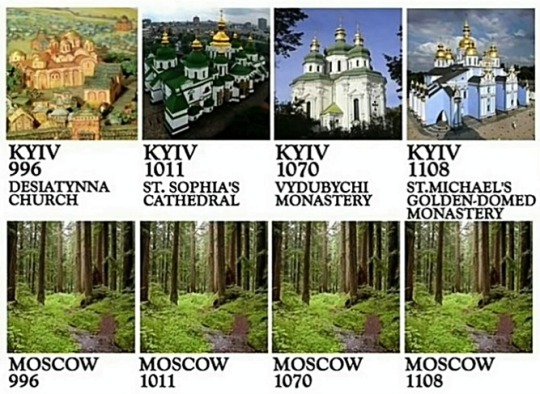
East Slavic (as opposed to West or South Slavic) culture had its roots in what is now Ukraine.
In the 11th century Kyiv was thriving at a time when what is now the Kremlin was just a place where traders on their way to Novgorod would stop to pee.
Russia even sort of stole the name of the country from Kyivan Rus'.
How Moscow hijacked the history of Ukraine-Rus’
At best, Russia is a former colonial power seeking to re-impose itself on its lost colonies.
Imagine the outrage if Britain tried to take back Nigeria or Kenya. It is hypocritical to be anti-colonialism in Africa and not be anti-colonialism in Europe.
Russia needs to go home and stay home. The only thing to negotiate is how many days it would take Russia to leave Ukraine.
#invasion of ukraine#stand with ukraine#russia#neo-colonialism#kyivan rus'#east slavic culture#muscovy#russian imperialism#vladimir putin#winter is coming for vladimir putin#московия#владимир путин#путин хуйло#москва#союз постсоветских клептократических ватников#путин – это лжедмитрий iv а не пётр великий#руки прочь от украины!#геть з україни#вторгнення оркостану в україну#київська русь#київ#будь сміливим як україна#слава україні!#героям слава!
52 notes
·
View notes
Text

#i am a furry at heart. forever#hetalia#aph russia#aph america#rusame#kjeller's#i love when a design motif is matching.........#rus is a lynx n ame is a mule deer.. or rlly any deer they look pretty similar lol
20 notes
·
View notes
Text
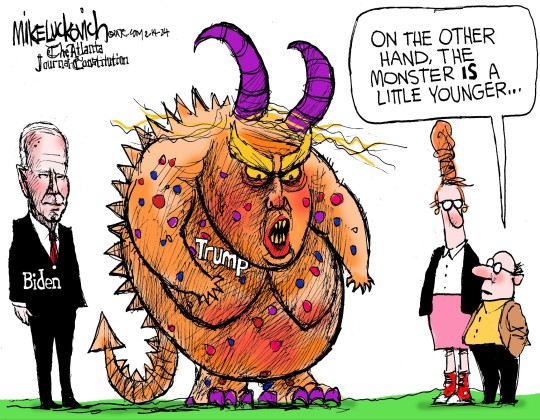
#editorial cartoons#mike luckovich#election 2024#age#biden#tRUmp#(the RU stands for RUssia)#decisions decisions#political cartoon
95 notes
·
View notes
Text

Russia art :3
Oh, and now I've got them↓↓↓
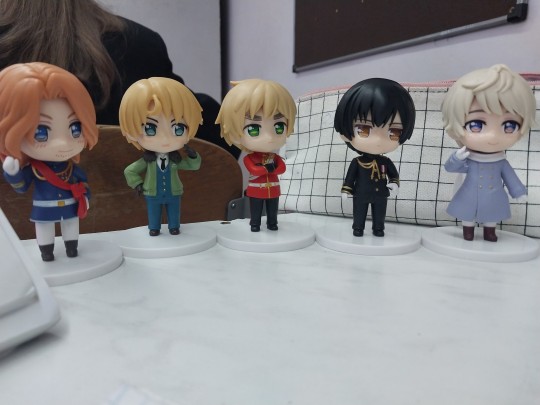
27 notes
·
View notes
Text
Although it is pointless to play on the russian ground of "who is a rightful inheritors of the crown of Kyivan Rus'" because we live in the fucking 21st century and the rules of monarchical inheritance are irrelevant in the modern nation-making, there are still interesting historical parallels to make.
When the founder of Moscow, prince Yuri Dolgoruky first conquered Kyiv, he was initially kicked out by the local elite (and, eventually, was assassinated by them), because Kyivan tradition always assumed involvement of locals in self-governance. On the contrast, the Suzdal' kingdom from which Yuri came, had an autocratic tradition even back then, which Yuri unsuccessfully tried to establish in his newly acquired lands, because of which the local aristocracy, which expected its opinion to be respected, revolved.
And to this day, we see the difference between the political psychology of our two countries. Ukraine still is divided by "local princes" - oligarchs in modern iteration - who accumulate the capital and use the acquired power to push their interests on the governmental level; and in russia the Duma is nothing but a bunch of their despot's yes-men who pantomime an illusion of democracy noone finds believable anymore.
Why of course, yes, Ukraine, and Russia, and Belarus culturally come from the same roots - just like partially Lithuania and Poland - but it would be disingenuous to view Rus' as one monolith that created a "Slavic nation". Ukraine clearly draws more heritage from the Kyivan branch, because duh - Kyiv is still here, I can personally vouch for that. And muscovy's tradition takes root in Novgorod and Suzdal kingdoms, which, while being politically of the same branch, had their own distinguishing features that set them apart, for example, the influence of the Golden Horde, which we do not have.
Medieval Eastern European is so complex, and to simplify it in order to push a certain political agenda of a certain nation with imperialistic ambitions... Idk. The more I learn, the more it doesn't fit, and the more I see the puppeteers' hand behind the scene. I don't understand why other people don't.
100 notes
·
View notes
Text
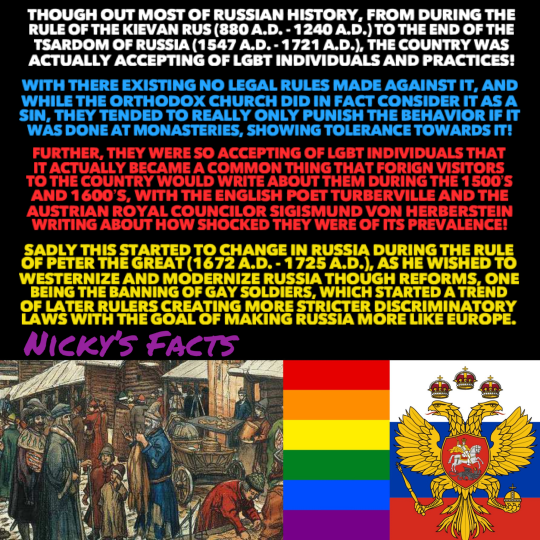
Russia traditionally was a very accepting place for LGBT individuals!
🏳️🌈🇷🇺🏳️🌈
#history#lgbt#russia#kievan rus#tsardom of russia#lgbt history#medieval#moscow#queer#peter the great#russian history#medieval europe#lgbt russia#russian empire#gay#european history#lesbian#lgbtq#westernization#russian culture#lgbt community#lgbtq history#1100s#1500s#1600s#traditional practices#nickys facts
53 notes
·
View notes
Text
I finally installed the legendary pirate goblin version of "Ghost Dogs of Moon Lake" (russian version, of course))
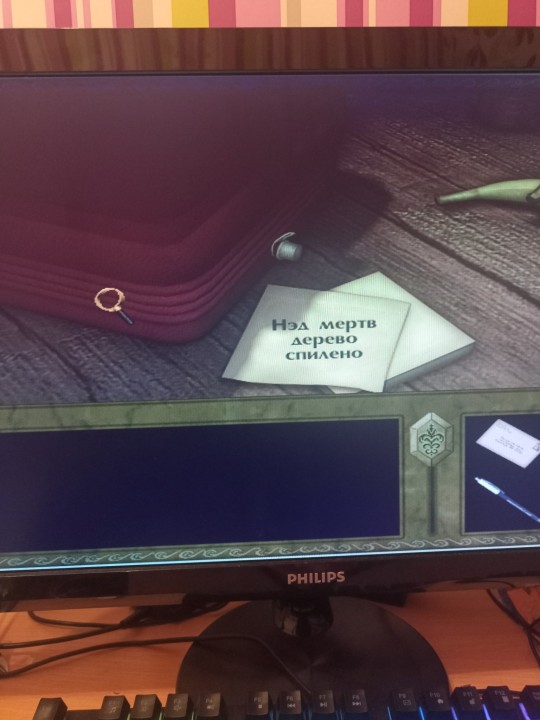
And this legendary inscription: Ned is dead, the tree is cut down
Love it!!! XD
#nancy drew#nancy drew games#nancy drew russia#clue crew#her interactive#nancy drew pc#ghost dogs of moon lake#alexei markovic ru
43 notes
·
View notes